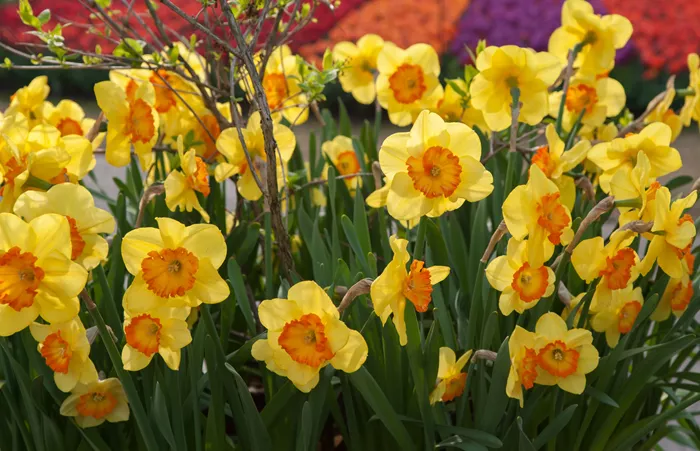Planting daffodil bulbs in Melbourne requires careful timing to ensure the best growth and blooming. Understanding the local climate and the best planting seasons can make all the difference in achieving vibrant and healthy flowers. This article explores the ideal time to plant daffodil bulbs, step-by-step instructions, and important care tips for gardeners in Melbourne.
Understanding Daffodils
What Are Daffodils?
Daffodils (Narcissus) are popular spring-blooming bulbs. These hardy perennial flowers are well-known for their cheerful yellow, white, and orange blossoms. Daffodils are easy to grow and thrive in well-drained soil and full sunlight. Their blooming time, however, is highly influenced by when they are planted.
Why Timing Is Important
The timing of planting daffodil bulbs directly affects their ability to sprout, bloom, and thrive. If planted too early or late, the bulbs may not develop properly. Understanding the Melbourne climate and planting conditions will give gardeners the best chance of success.
When to Plant Daffodil Bulbs in Melbourne
Best Planting Time
The best time to plant daffodil bulbs in Melbourne is during late winter to early autumn, specifically between late April and early June. This gives the bulbs enough time to establish their roots before the colder months arrive. Planting them too early could expose the bulbs to frost, while planting too late can result in delayed or missed blooming seasons.
Why Late Autumn to Early Winter?
Late autumn and early winter offer cooler temperatures which help encourage root development without triggering premature sprouting. This timing also ensures the bulbs will be ready for the cooler spring months when they can bloom and thrive.
How to Plant Daffodil Bulbs in Melbourne
Preparing the Soil
Daffodils require well-drained soil for optimal growth. Before planting, improve soil quality by adding organic matter or compost to provide essential nutrients. It’s crucial that the soil is not waterlogged, as excess moisture can cause bulb rot. The ideal pH range is slightly acidic to neutral (6.0 to 7.0).
Planting Depth and Spacing
Plant daffodil bulbs at a depth of 10 to 15 cm (4 to 6 inches), ensuring that the pointed end of the bulb faces upwards. Space the bulbs about 10 to 15 cm apart to allow for proper growth and air circulation.
Watering After Planting
After planting, water the bulbs thoroughly. This helps settle the soil around the bulbs and activates their growth process. However, avoid overwatering, as daffodils do not tolerate soggy conditions. Water lightly during the growing season, especially if rainfall is insufficient.
Factors That Affect Daffodil Growth in Melbourne
Climate Considerations
Melbourne’s temperate climate allows daffodils to flourish, but it can also present challenges. Winters are mild, which can occasionally cause early sprouting if the bulbs are planted too early. Understanding the local weather patterns is essential for determining the right planting window.
Sunlight Requirements
Daffodils thrive in full sunlight. Aim for a location that receives at least 6 hours of sunlight per day. A sunny spot helps the flowers bloom with their bright, cheerful colors, creating a striking visual display in your garden.
Soil and Drainage
Good drainage is crucial to avoid bulb rot. If your soil is clay-heavy, consider planting daffodils in raised beds or amending the soil with organic matter to enhance drainage. Daffodils will not tolerate wet feet, so proper drainage is key to their survival.
Care Tips for Daffodils in Melbourne
Fertilizing Daffodils
While daffodils don’t require heavy feeding, it’s beneficial to apply a balanced fertilizer during planting. You can also fertilize the plants once they emerge in spring. Use a slow-release fertilizer that promotes root and flower development.
Pruning and Deadheading
After daffodils bloom, it’s essential to deadhead spent flowers to prevent the plant from wasting energy on seed production. However, leave the foliage intact until it naturally turns yellow, as this allows the plant to gather nutrients for next season’s growth.
Dealing with Pests and Diseases
Daffodils are generally pest-resistant but can occasionally fall victim to aphids or narcissus flies. To manage pests, keep the garden clean and remove any affected foliage. Fungal diseases like powdery mildew can also affect daffodils, especially if the foliage is crowded or wet. Ensure proper air circulation around the plants to minimize disease risks.
Common Daffodil Growing Mistakes to Avoid
Planting at the Wrong Depth
One common mistake is planting daffodil bulbs too shallow or too deep. If the bulbs are too close to the surface, they may not develop a strong root system. Conversely, planting them too deeply can delay or prevent blooming.
Overwatering
Overwatering is another common mistake. Daffodils do not thrive in soggy conditions. Ensure the soil is well-draining and water sparingly, especially during wet seasons.
Not Allowing the Foliage to Die Back Naturally
Many gardeners make the mistake of cutting back daffodil foliage too soon. This can impact the plant’s ability to store energy for the following year’s growth. Allow the foliage to yellow naturally before removing it from the garden.
Conclusion
Planting daffodil bulbs in Melbourne requires thoughtful planning and understanding of the local climate. By planting between late April and June, preparing the soil, and providing appropriate care, you can enjoy beautiful daffodils every spring. With the right timing and maintenance, your daffodil bulbs will reward you with a stunning display of blooms that brighten up your garden year after year.


